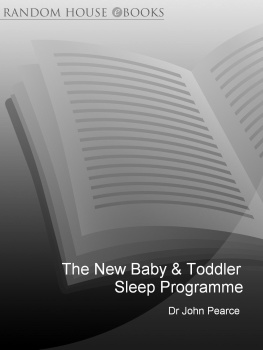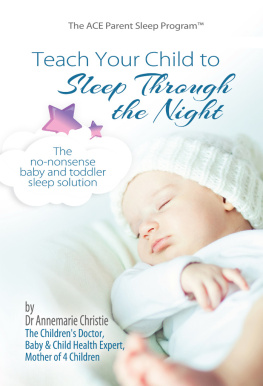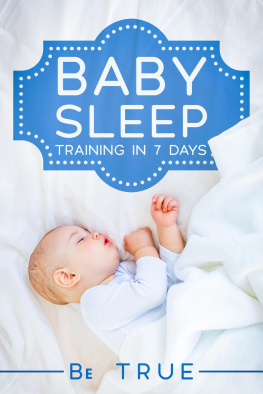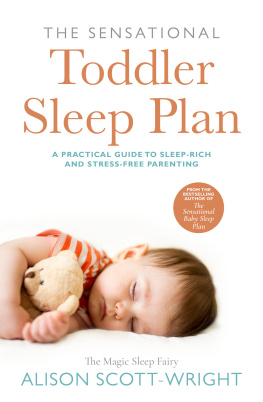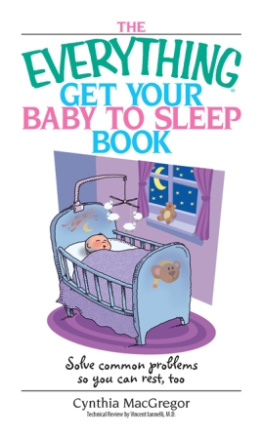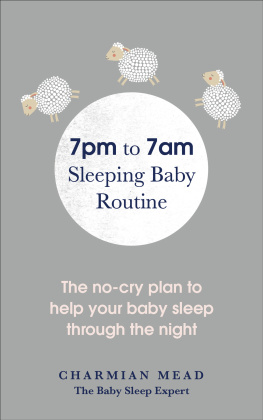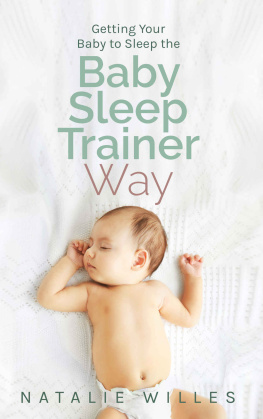The New
Baby and Toddler
Sleep
Programme
How to have a peaceful night,
every night
Dr John Pearce
with Jane Bidder
This eBook is copyright material and must not be copied, reproduced, transferred, distributed, leased, licensed or publicly performed or used in any way except as specifically permitted in writing by the publishers, as allowed under the terms and conditions under which it was purchased or as strictly permitted by applicable copyright law. Any unauthorised distribution or use of this text may be a direct infringement of the authors and publishers rights and those responsible may be liable in law accordingly.
Version 1.0
Epub ISBN 9781446489482
www.randomhouse.co.uk
7 9 10 8 6
Text copyright John Pearce and Jane Bidder 1997, 1999
All rights reserved. No part of this publication may be reproduced, stored in a retrieval system, or transmitted in any form or by any means, electronic, mechanical, photocopying, recording or otherwise, without the prior permission of the copyright owners.
First published in the United Kingdom in 1997 by Vermilion
This new edition published in the United Kingdom in 1999 by Vermilion
an imprint of Ebury Press
Random House, 20 Vauxhall Bridge Road, London SW1V 2SA
Random House Australia (Pty) Limited
20 Alfred Street, Milsons Point, Sydney, New South Wales 2061, Australia
Random House New Zealand Limited
18 Poland Road, Glenfield, Auckland 10, New Zealand
Random House South Africa (Pty) Limited
Endulini, 5A Jubilee Road, Parktown 2193, South Africa
The Random House Group Limited Reg. No. 954009
www.randomhouse.co.uk
A CIP catalogue record for this book is available in the British Library
ISBN 0 09 182591 1
Contents
For all sleepless parents
About the Authors
Dr John Pearce is Emeritus Professor of Child Psychiatry at the University of Nottingham. He has written a wide range of practical books for parents as well as numerous articles for magazines and newspapers. He is a speaker at national and international conferences on childcare issues and is a member of numerous professional organisations and committees. He has worked with children and families as a child psychiatrist for over 25 years. John is married with three children.
Jane Bidder has been a journalist for the past twenty years and is a regular contributor to various national magazines and newspapers including Woman, Woman & Home, The Times and The Daily Telegraph. She is married to a solicitor and they have three children. As a result, they know all about sleepless nights! Jane represents the softly-softly approach in the book.
Introduction
Pick up a selection of New Baby greetings cards and youre bound to find at least one with a cartoon picture of a typical New Father.
Hell be standing in a candlewick dressing-gown with heavy, half-closed eyes ringed with exhaustion. In the background, a baby will be screaming and to drive the point even further home the clock will be pointing to 3 a.m.!
We laugh because, as parents, we know its not far from the truth.
New parents dont usually get much sleep. Suddenly, they are thrown from a normal civilised adult life into a semi-comatose existence centred around a small baby who sleeps fitfully when they least want him to. (Please note that unless a specific child is being written about, throughout this book your baby is referred to as a he, not because of any bias but to differentiate the mother or child carer from the baby.)
As that baby grows up, life doesnt always get much better. Does your child sleep through the night yet? is a much-discussed question and topic of conversation from six weeks to five years and even beyond. Does he come into your bed in the night? is another question frequently asked by mothers.
Some babies do sleep regularly at night. Sometimes this is a matter of luck. But it also happens because their parents have worked at it. Yes, you can work on sleep just as you work at getting solids into that small reluctant mouth. Or persuading your toddler that he can be dry at night.
Sleeping is one of many habits which, as parents, we need to cultivate in our children. If you see it this way, it somehow becomes a more achievable goal. Instead of relying on luck, you can train your child and yourself into having unbroken nights.
Habits established during childhood tend to last into adult life, so it is important to try to set up good habits early on. This takes time, perseverance and repetition but is worth it in the end. Of course, children vary in how responsive they are to training at different stages of development. The developmental stages of sleeping and waking habits are explained in this book. If no specific age is mentioned, you can assume that the information applies to all children over the age of six months.
But it will probably take time. And you may feel you havent got much of that at the moment.
If you persevere, youll find theres a big pay-off at the end. Not only will you get that rest which you so badly need, you will also make sure that your child gets rest too. And hell have learned yet another lesson in his long climb towards independence.
Theres another plus, too. If you can get your child into a regular sleeping pattern, the whole family will benefit. Not just you but also your partner. Remember? The one who got you into this in the first place! It will also help any other children you have who need your attention, too. New babies often make siblings jealous. And its no wonder if they are constantly awake and hogging the limelight.
So much for theory. What about the practice? How can we actually make that screaming baby or toddler go to bed?
Read on and see.
C HAPTER O NE
And so to sleep
EVERYONE NEEDS SLEEP . Not just children but parents too! Its amazing how much better we feel when weve had a good rest. Somehow, its easier to deal with a difficult baby or child when we feel well inside ourselves. And sleep contributes to feeling well.
Although we know that we need sleep, how can that help us to cope with a baby who wakes every half hour or a toddler who has decided that its time to get up at 2 a.m.?
We tell ourselves that we need sleep and that our child can be taught how to stay happily in his bed. We persevere and hold on to a conviction that we can succeed.
Everyone is different
Sleep cant be turned on or off at will but it is a habit and is one of the first routines which children need to get into.
However, about one in three children aged under five are reported to have disturbed sleep. And of these, 30 per cent could be said to have a serious problem.
Jeremy
Jeremy was nine months old. He was the second child and his parents were astonished by how different he was from the firstborn. Jeremy seemed to cry a lot but it was not ordinary crying: he would scream, go red in the face and his little body would go stiff with anger as he yelled. He was difficult to feed, difficult to settle, wriggly and certainly not cuddlesome. His mother began to believe that she must be doing something wrong or that perhaps she had been given the wrong baby by the hospital. She consulted the health visitor and the GP but nothing could be found wrong with Jeremy. Then Jeremys mother read in a magazine that some children are born with a difficult temperament and they behave just like Jeremy. She was pleased to read that most children with a difficult temperament gradually settle down. The article suggested that children like Jeremy benefit from a great deal of routine in their life with very clear limits being set for their difficult behaviour. At the same time they require extra loving care and close supervision. Jeremys parents put this into practice and very gradually their persistence paid off and a year later everybody remarked at how much easier Jeremy seemed to be. The bedtime routine seemed to have been particularly helpful and meant that the evenings had become a peaceful time for everyone

